There are many things which Freemasonry will do for a man in the way of opening his mind and giving him larger and kindlier views of life, but Freemasonry itself, with all its power to polish and refine, cannot eradicate the natural bias of the disposition.
– The Freemason’s Chronicle 17th April, 1875
Thus, the prompt man flowers into a prompt Mason, the dilatory man is ever behindhand with his Masonic duties; and so, through all the mental gamut, from the man who talks overmuch, down to the man who does not talk at all, Masonry is a microcosm; a world in little, wherein we may behold all the varieties of mankind.
These differences of temperament and habit are seen in no relation more clearly than in attendance at Lodge; and in cataloguing a few varieties, in sticking pins through the Masonic butterflies, and in arranging them herewith in our cabinet, we shall be very tender with the specimens, not to rub the faintest blue, not to soil the brightest silver, but to leave jewels and scarlet and gold as unsullied as when free in air they wantoned about the Masonic world.
He who marches on the right of the first four in the Masonic regiment is the man who never misses attendance at Lodge.
As certain as that you will get from the secretary your notice of meeting, with its due array of initiations, passings and raisings, so certain is it that, come what come may, HE will be in his place.
His is probably the first face which will greet you as you pass the sacred portal guarded by the mysterious tyler.
A quick, ready man, versed in all the details of the Craft, generally bland and courteous, willing to impart information, and help in the duties which repetition and practice have made a second nature to him, the constant attendant is the safe pilot of the young Mason, the man to find out and follow.
A beacon through many a dark passage, at the further end of which burns the shining light of knowledge.
In contrast, next comes the man who is rarely seen.
Something is always happening to the man who is rarely seen.
Sometimes he is ill.
Sometimes overwhelmed with business.
Sometimes he has sickness at home.
Some-times he is out of town.
Sometimes his affairs are going badly.
Sometimes he is so profitably employed that he can not spare time, but whatever the reason be sure he is never without an excuse.
It is always, “My dear boy, I just missed coming last time, but will be sure to be with you at next Lodge,” for the man who is rarely seen is the Prince of Apologists.
The Lodge worker is like a herring caught in June.
He is king of his kind.
Indeed, without him there would be no Lodge at all.
What, he works fit, or why he works must always remain a mystery to the majority of the world, but he does work, and very hard too.
His is a work which cannot be done by deputy, or it would cease to be his.
The Lodge worker is therefore the real working man; moreover, he has this advantage over certain other working: men not unknown to the franchise, that besides being the actual governing power he has been at pains to ascertain the principles of government.
Masonry is, not without reason, proud of the circumstance that kings have stepped from their thrones, generals from the heads of armies, and men of genius from the world’s applause to mingle in the obscurities of the brotherhood;
– but Masonry is prouder still of those brethren, let their rank in life be what it may, who, led on by pure love of virtue, devote their talents and leisure to mastering our magnificent ritual, and passing it on to new generations of men, perfect and unchanged.
We are living- in a world where God has set in every field and copse embroidery of moss and glittering jewels of sun-lit rain drops and morning dew; thus, seeing rich beauties in our Mother Nature’s face, we are not insensible to the worth of the outside shows of things, but we know it is in the common earth, under the beauty, and hidden from the light, that the principle of growth may be found at work.
We do but praise the face of our Mother Nature for the changing tints and flying clouds, the trees and rocks and glistening seas, and all delightful sights which make it happiness to be awake and out in the open air, but we are grateful to our Mother Earth because she grows the corn to keep our bodies alive, because she is, in fact, the Lodge worker.
If the Lodge worker deserves praise, the Lodge talker deserves only “multitudinous laughter”.
The Lodge talker is a Masonic jack-in-the-box, ready, the moment the cover of opportunity is lifted, to spring up and make a speech.
For him no subject is too small, nor any too great.
He will make you a half-an-hour’s oration concerning an odd sixpence in the charity-box, and finish up with a substantive motion that he will by deed of gift make the nineteen shillings and sixpence into the round sum of one pound sterling.
He is a creature who constantly “wants to know, you know,” and is for ever asking questions which answer themselves.
Not content with the interruption which his own babble occasions to serious business, he generally wears creaking boots, and as he passes about from brother to brother, with the stealthy motion of a sparrow-hunting cat behind a garden wall, his whispered nothings into unwilling ears are scarcely more irritating than the jerky creakings of his dry leather.
The Lodge talker is no less a man and a brother because he is ridiculous, but he would confer a favour on his Lodge if he did not talk quite so much.
Now, for the least hurting pin, and the nicest bit of cork for our harmless brother, the “Wallflower”.
Through thy somnolent centre, Oh, harmless brother, let us press tenderly, for we well know not even pain would elicit complaint from thee.
As thou sittest by the wall, silent, with grave face, looking out under placid brows, who shall say what is passing within the deep caverns of thy unvocal brain.
Thou seest the Masonic world go by in panoramic procession, thyself the silent observer of other men’s mouthings.
What brilliant strokes of policy mayst thou not have engendered, being all too modest to formulate them into words.
What Demosthenic orations mayest thou not have delivered to thyself, what wit, what humour, dimly floating in a sea of inarticulate elaboration, may not have been thine.
Brother Wallflower, sit silent and be happy.
Saying too much has often got a man into a scrape, yea, even the newspaper scribe is not free from the vice of wordiness, but thou art safe.
A bunch of wallflowers in a cottage window shall scent you the house through with a sweet savour, so that a man, grateful for all sorts of blessings, shall be likewise grateful for thee.
Worse than the man who never misses and than he who is rarely seen; not to be compared with the worker, lower than the talker, infinitely less worthy than the wallflower is he who never attends at all; so bad, so wicked, so much to be blamed is he that some day he shall have a small essay all to himself.
The worst offence of which a Mason can be guilty is indifferentism, and the worst compliment he can pay to a good Worshipful Master is to stay away from Lodge.
It has been brought against Masonry that it is clannish.
Let us accept the sneer.
As the terms Whig and Tory were first terms of opprobrium, and came afterwards to he accepted as the honourable titles of the two great parties in the State, let us also take to ourselves this reproach of clannishness, the first principle of which is loyalty.
The Worshipful Master is head of the clan for the time being, when he summonses us let us rally round him, and prove that we are faithful to our allegiance by a regular attendance at Lodge.
 The Freemasons Chronicle, a weekly record of masonic intelligence, was first published 2nd January 1875 London, England as an independent weekly journal of masonic interest and continued for 27 years.
The Freemasons Chronicle, a weekly record of masonic intelligence, was first published 2nd January 1875 London, England as an independent weekly journal of masonic interest and continued for 27 years.
It should be the business of a journal devoted to the interests of the Order to attempt the removal of prejudices such as these, which, though they may have little perceptible influence upon the prosperity of the Fraternity, yet have the effect of preventing timid or ill-informed persons from enlisting under its banner.
It will not only attempt to keep pace with the growing literary requirements of the day, but it will seek to exhibit the Order to the non-Masonic world divested of its technical details, and clothed in the garb of Charity and Brotherly Love.
The questions of the hour, which exercise the minds of thoughtful men, will be handled freely and broadly, without any tinge of political or sectarian bias.
The memoranda of Masonic gatherings which will appear from week to week, will be full and accurate; and as free interchange of opinion is one of the best signs of life and vigour in any society, ample scope will be given for Correspondence on topics of interest to the Order.
If we may venture upon a new rendering of words which recent events have made memorable, we will say here, once and for all, that we will be keen men of business, and will spare no effort, consistent with honour, to achieve commercial success; but first, and before all things, we will prove to our brethren and the world that we are FREEMASONS.
Recent Articles: The Freemason's Chronicle
 Operative And Speculative Masonry Explore the fascinating transition from Operative to Speculative Masonry in our latest post. Discover historical insights from Augustus C. L. Arnold and Rev. Wm. P. Strickland, shedding light on Freemasonry's evolution and its enduring principles. Dive into the rich history and significant milestones that shaped modern Freemasonry. - The Freemason's Chronicle - 2 September 1876 |
 Discover the true essence of Freemasonry, an ancient order founded on the profound principles of love for God and man. It's a call to rise above mere appearances, to embody genuine virtue and benevolence, transcending societal pretense. Embrace the transformative power of simplicity, and let the authentic glories of Freemasonry inspire your path. |
 Discover the intriguing story of a man who became a Mason but openly professed his dislike for the institution. Unravel the peculiar circumstances that led him down this path and explore the unexpected consequences that followed. Dive into this thought-provoking account that challenges our notions of loyalty and reveals the complexities of human nature within the Masonic fraternity. |
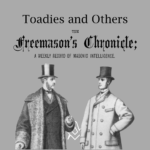 In the realm of Masonry, the principles of equality and respect are paramount. Yet, the presence of toadies—those who obsequiously seek favour from the influential—threatens these ideals. While Masonry embraces diverse beliefs and backgrounds, it rejects the sycophantic behaviours of toadies, flunkeys, and tuft-hunters, urging members to uphold genuine respect and self-worth. The Freemason's Chronicle - 22nd January 1876 |
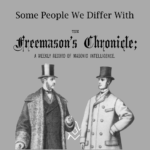 Unveiling the Unpleasant: Some People We Differ With Discover the intriguing dynamics of quarrels within the Masonic brotherhood. From the cantankerous to the litigious, the peevish to the vengeful, delve into the characters that challenge fraternal harmony. Explore their motives, temperaments, and the art of navigating disputes with these fascinating brethren. Brace yourself for a riveting journey into the world of conflicting personalities. |
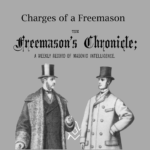 Unravelling the Masonic Mystique: A Deep Dive into the Freemasons' Charges - Explore the intricate world of Freemasonry, its principles, rituals, and the mechanisms for resolving internal disputes. Discover how this ancient fraternity fosters unity, promotes moral conduct, and upholds the sanctity of its secrets, while navigating the complexities of modern society. - The Freemason's Chronicle - 4 December 1875 |
 Unlock the hidden lessons of Masonic Studies! Don't settle for superficial knowledge or mere rituals. Discover the true depth and meaning behind Freemasonry. Expand your understanding of Tracing-Boards, Lectures, and more. Join regular Lodges of Instruction to enhance your Masonic journey. Become a knowledgeable Freemason, not just a token-bearer. Unleash the power of true Masonic wisdom today! |
 Uncover the incredible story of how Masonry saved the life of a Crimean War foot soldier in this historical and masonic account. Through the first hand experience of a soldier engaged in fierce hand-to-hand combat, witness the fateful encounter with a Russian Freemason that changed the course of his life. Learn how brotherhood and a deep dedication to the craft can lead to unforeseen and life-saving circumstances on the battlefield. |
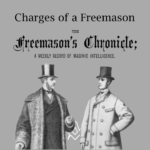 The Freemason's Chronicle - Charges of a Freemason The secrets of Masonry are the exclusive property of the Craft, and can never be communicated to one who is a mere labourer and not an accepted Mason. Hence, no labourer, that is, one who has not been regularly initiated in a legal Lodge. Article first published in The Freemason's Chronicle, 27 November 1875 |
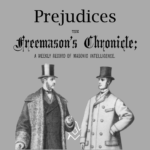 The Freemason's Chronicle - Prejudices Prejudices are partial judgments in favour of, or against certain persons or things, and, for convenience sake, may be ranged in two categories—those which are, comparatively speaking, harmless, and those which are harmful. Article first published in The Freemason's Chronicle, Oct. 2 1875. |
 The Freemason's Chronicle - Cliques Is Freemasonry - a Clique ? Man has been defined as a gregarious animal, but in his highly civilised condition he is gregarious only to a limited extent. First published in The Freemason's Chronicle, Oct. 2 1875, addresses the same challenges then as now. |
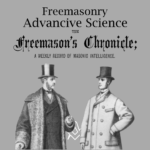 The Freemason's Chronicle - Freemasonry - an Advancive Science Is Freemasonry - an Advancive Science ? Not to confuse advancement with innovation. Has it been the case that Freemasonry's survival for 300 years plus is due to being an Advancive Science, tending to advance. First published in The Freemason's Chronicle 18 September 1875, addresses the same challenges then as now. |
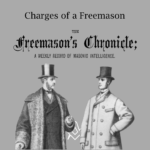 The Freemason's Chronicle - Charges Of A Freemason An interpretation of the "Charges of a Freemason", written Bro. Cornelius Moore and published in 1875, that introduce certain opinions that for some readers, will not sit well in contemporary times. - The Freemason's Chronicle, Sept. 11, 1875 |
 On The Order Of The Temple And Its Doctrine. THE Order of the Temple is divided into two great classes, denominated respectively the Order of the Temple and the Eastern Order. The Eastern Order gave birth to the Order of the Temple, and in the course of time has become an appendage of the latter. It is in ancient Egypt that we find the cradle of the Eastern Order. The Freemason's Chronicle, Sept. 4, 1875 |
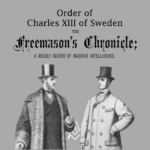 Order of Charles XIII of Sweden The following translation of the Manifesto of King JL Charles XIII of Sweden, on the occasion of his establishing the Masonic Order which bears his name, and of the Statutes of the said Order, may be interesting to our readers. The Freemason's Chronicle, Aug. 28, 1875 |
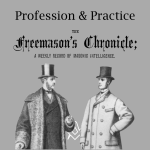 Most of our readers in the course of their experience, have doubtless met with enthusiastic brethren who take it for granted that a Mason can do no wrong. These enthusiasts are thoroughly convinced that the vast majority of those who join the Order are the most benevolent, the most moral, and the very noblest members of society. - The Freemason's Chronicle 10 July 1875 |
 An article investigating the relationship between masonry and citizenship. Are the principles of Freemasonry aligned with the freemason's claim to be a better citizen of the world? The Freemason's Chronicle - 19 June 1875 |
 A visitor must make clear his identity to the satisfaction of the Lodge he proposes to visit. More than once have we been asked to explain our views as to the reception of strangers in a Lodge. - The Freemason's Chronicle - 29 May 1875 |
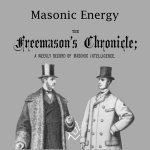 Is there reason in the accusation that Masonic energy looks only to a course of good feeds, when we can point to such grand results as have been achieved in these latter years, both in respect of the extension of our Order ? - 1May 1875 |
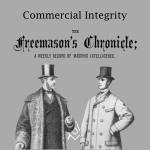 Implementing Freemasonry's peculiar system of morality in our day to day business affairs was the topic of this article, Commercial Integrity, first published in The Freemason's Chronicle - 8 May 1875 |
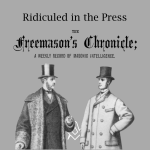 Ridicule has been somewhat illogically described as the test of truth. If it were so, Freemasonry ought to have perished long since. Two press reports from May 1875 covering the |
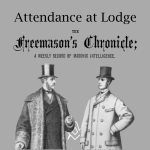 There are many things which Freemasonry will do for a man in the way of opening his mind and giving him larger and kindlier views of life, but Freemasonry itself, cannot eradicate the natural bias of the disposition. |
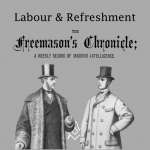 There is, we fear, too marked a tendency in very many Lodges to hasten through its labours, with a view to entering, as soon as possible, upon the business of refreshment. - The Freemason's Chronicle 17th April, 1875 |
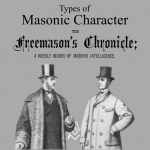 Another example that demonstrates that nothing really changes in Freemasonry. In an article the Types of Masonic Character published 145 years ago in The Freemason's Chronicle 10th April, 1875 |
 A brief history on the relationship between the British Monarchy and the craft - The Freemason's Chronicle 20th March , 1875 |
 What are the qualities of a convivial man and how does this dovetail perfectly in to Freemasonry ? 16th March, 1875 |
 A review of the "Sketch for the History of the Dionysian Artificers," a fragment, by Hyppoli to Joseph Da Costa - This little work may be regarded as, so to speak, the Holy Grail of Masonry. |
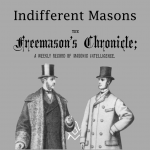 Nothing really changes, an article Indifferent Masons, From Le Monde Maçonnique 1874. Translation published in The Freemason's Chronicle 20th February, 1875 |
 In handling an intruder in the lodge, we endeavoured to show that a good Mason should be a gentleman, and a sincere man. The Freemason's Chronicle 20th February, 1875 |
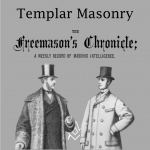 Templar Masonry - a historical aspect of the Religious and Military Order of the Temple published in The Freemason's Chronicle 13th February, 1875 |
 Secrecy perhaps the strongest objection urged by the enemies of the Masonic Order against its existence published in The Freemason's Chronicle 20th March 1875 |
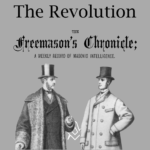 Freemasonry In The United States during And After The Revolution We take a look at Freemasonry in the United States during and after the Revolution first published in The Freemason's Chronicle - February 6, 1875 |
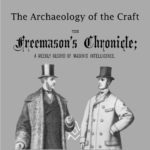 We take a look at the archaeological connection with the Craft, first published in The Freemason's Chronicle - January 30, 1875 |
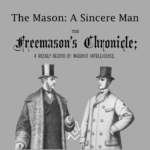 What it means to a Freemason to be a sincere man. Extract: first published in The Freemason's Chronicle - January 23, 1875 |
 What it means to a Freemason to be a citizen of the world ? First published in The Freemason's Chronicle - January 16, 1875 |
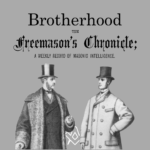 Brotherhood! In that one word what sympathetic associations arise. First published in The Freemason's Chronicle - January 9, 1875 |
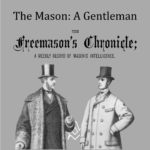 This opening article was written 145 years ago, yet it resonates with Freemasons today as it did then. First published in The Freemason's Chronicle, January 2, 1875, Issue 1 |
masonic knowledge
to be a better citizen of the world
share the square with two brothers

click image to open email app on mobile device








